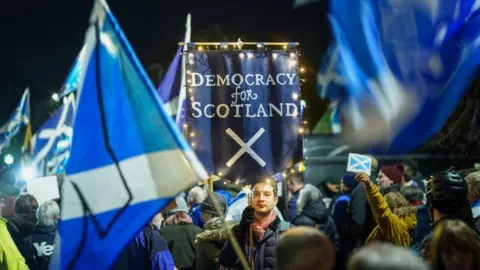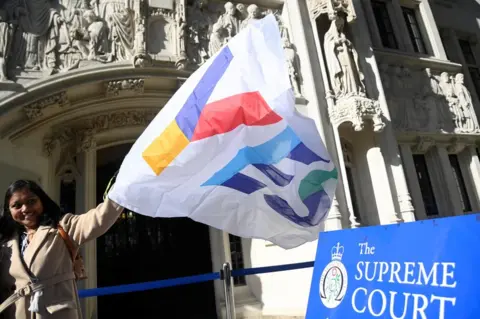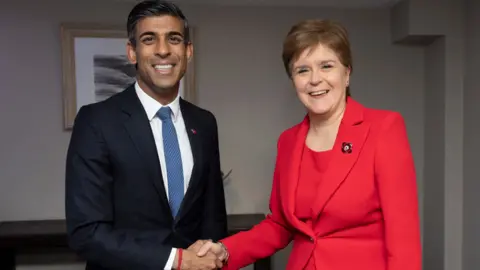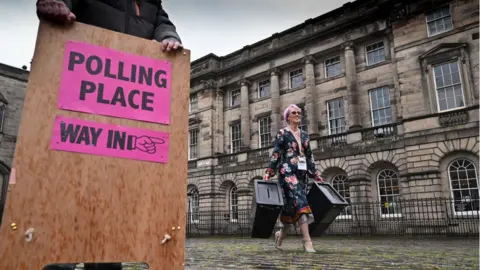Scottish independence: What is a de facto referendum?
 Getty Images
Getty ImagesFirst Minister Nicola Sturgeon wants the next general election to be a "de facto referendum" on independence, after the Supreme Court ruled that she does not have the power to hold an actual referendum without the UK's government's consent.
But what is a de facto referendum and is there any prospect of it settling the issue of independence once and for all?

Why is this happening?
The Scottish government was planning to hold an independence referendum on 19 October 2023.
But judges at the Supreme Court ruled that this can only happen if the UK government agrees, as it did in the run-up to the previous referendum in 2014.
With no realistic prospect of that happening any time soon, Ms Sturgeon was left looking for another way to put the question to the country.
She now wants to use the next UK general election - which must be held by January 2025 at the latest - as a "de facto referendum".
"De facto" is Latin for "of fact", and in this case means the vote would effectively take the place of a referendum, and have the same effect as one.
How would it work?
The idea is that the SNP would make it clear that they are campaigning on a single issue, and that every vote for them is effectively a vote in favour of independence.
The plan is still to be fully fleshed out, with the party to hold a special conference in the new year to agree what would be in their manifesto for that election.
But it is likely that if the SNP wins more than 50% of the votes in Scotland, Ms Sturgeon would use that in the same way as a referendum result and look to open negotiations with the UK government about Scotland's exit from the UK.
There is of course no guarantee that the UK government would agree to this, and there is nothing in law that would force it to do so.
Winning more than half of the votes is also an extremely high bar to cross in a multi-party election.
The SNP fell just short of it even while winning a huge landslide in 2015, and won 45% of the votes at the last general election in 2019.
The last time any party in Scotland won got more than 50% of the votes was the Conservatives in 1955.
That makes it quite a gamble for Ms Sturgeon to stake her entire future on.
 Reuters
ReutersWhy take the risk?
Nicola Sturgeon has been quite clear that this is not her preferred option.
In fact she has previously described the idea of using an election as a referendum as a "unionist trap", and SNP delegates booed one then-member who pushed the suggestion at a conference in 2019.
But with other doors closing, the first minister feels she has no other move to make.
Her Plan A of an agreed referendum has been denied by Downing Street, and her Plan B of setting one up herself has been dismissed by the courts. Maybe plan C isn't as good, but it's all that's left.
It's better than no plan at all, and gives the independence movement something to focus on and work towards.
Ms Sturgeon also thinks the difficulties around the idea allow her to make a campaigning point - if this is such a bad idea, why is it the only one left open to her? Why not have a referendum instead?
In part, the strategy here is still about trying to force UK ministers to come full circle on Plan A, and strike a 2014-style deal.
But if Downing Street continues to refuse, the SNP may have no choice but to follow through.

Would other parties take part?
The pro-independence Greens are certainly up for the idea, and say votes for them would count towards the 50% target.
It is unclear whether this would involve them standing on an identical manifesto, and whether the party would look to contest every seat in Scotland - they have never done so at a Westminster election, and indeed had only three candidates as recently as 2017.
The Conservatives also love campaigning on the constitution in Scotland, as it helped them climb into second place at Holyrood in the aftermath of the 2014 vote. That doesn't mean they would accept Ms Sturgeon's proposal though.
They would probably claim victory either way - if the pro-independence side topped 50% the Tories would say it clearly wasn't a vote on that anyway, whereas if they fell short the party could gleefully embrace it as a defeat for the SNP and the end of the matter.
Labour would also be deeply unlikely to sign up, because they have a very clear goal of their own for the next general election - to take control of Downing Street. They will want the election to be a referendum on Tory government, not on independence.
Labour are already arguing that the way to get rid of the current government is to vote for a different one, and could pitch that as being less of an upheaval than having to draw up a border at Gretna.
 Getty Images
Getty ImagesWould this settle the issue of independence?
This is the really crucial question. Is this a practical way of answering the constitutional question?
Ms Sturgeon wants to deliver independence, and to get Scotland back into the EU. Whatever process she follows needs the legitimacy and international recognition to make that happen.
There are a few years for points like this to be kicked around, and for questions to be put to everyone potentially involved. That goes as much for policy as for process - the Scottish government is still in the process of building its detailed platform for independence, including how EU membership could be secured.
But the very fact that a general election is not a binary contest means it could throw up all sorts of different results which would change the facts on the ground.
For example, what if the SNP fell short of the 50% mark - even by a long way - but ended up holding the balance of power in a hung parliament?
They could then use that leverage to get to a referendum, even if they had just lost their "de facto" version.
So there are plenty of potential twists and turns left in the constitutional debate yet.
It's one after all which has been sustained not just by political parties, but also Scotland's electorate - which has repeatedly produced SNP victories in elections, but without ever tipping over to the point of decisively backing independence in polls.
The judges have done their bit in answering the legal question of process put before them. But be it by election or referendum, this is an issue which will ultimately need to be resolved in the political arena.
